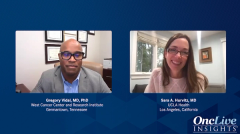
Novel ADCs Under Investigation in Triple-Negative Breast Cancer
Expert oncologists review novel ADCs in TNBC and consider how their approval may impact sequencing of therapy in this setting.
Episodes in this series

Transcript:
Sara A. Hurvitz, MD:What are your thoughts on other ADCs in this realm? Are you hearing data, are you interested in learning more about drugs like datopotamab deruxtecan or trastuzumab deruxtecan [T-DXd]? It's going to be a crowded area quite soon I think, so, give me your input here.
Gregory Vidal, MD, PhD: It is certainly going to be a crowded area, and we saw data at the ASCO 2022 Plenary with trastuzumab deruxtecan showing improvement in progression-free and overall survival in HER-2 low, which included triple negative, ER [estrogen receptor]- negative as well as HER2 low, and that was about 11%, maybe 50 patients in each arm, so it's a small subset, but even within that subset, there is a benefit. So, I really am looking forward to a larger study looking at that population.
What we have to then think about is sequencing because, as we talked about, sacituzumab before is the topoisomerase 1 inhibitor, trastuzumab deruxtecan is also a topoisomerase 1 inhibitor, and whether or not there is cross-resistance from these 2 drugs, if you can use 1 after the other. I suspect, much like the microtubule inhibitors, we may still have activity, 1 after the other, but that's interesting. Then we talked about the HER3 ADC, which is another target, but with a similar payload which also includes triple negative. It was a small study, but again, that showed activity, not only in the ER positive but also in the triple negative. So, there are lots to look forward to in that space. Sequencing is certainly going to be a conversation we'll be having because I know, for example, there's an investigation looking at sacituzumab coming up in the first-line setting. If it does get up there, then what comes behind? There are lots to look forward to, but it's a good time for triple-negative breast cancer.
Sara A. Hurvitz, MD:Thank you. That's so well said, and I agree with you completely. I think we're going to need studies to define how to sequence and whether or not cross resistance occurs, especially when the payloads are so similar. I know in the TROPION-Breast01 study [NCT05104866], or TROPION-PanTumor01 study [NCT03401385], they did have some patients who had received sacituzumab previously who were enrolled in that study and some benefited from the datopotamab, so it's a very exciting time and the data are rapidly evolving.
Transcript edited for clarity.







































